The reason for including data from both Global and Danish Data Providers in Research Portal Denmark is that within various areas, such as data coverage, types and enhancements, as well as target groups, there are a number of differences in the data. In order to get the best possible overview of Danish research the portal includes both types of data, as the data from commercial global and local Danish Data Providers complement each other.
The overview below outlines the most significant differences you may experience between the two types of publication data and databases: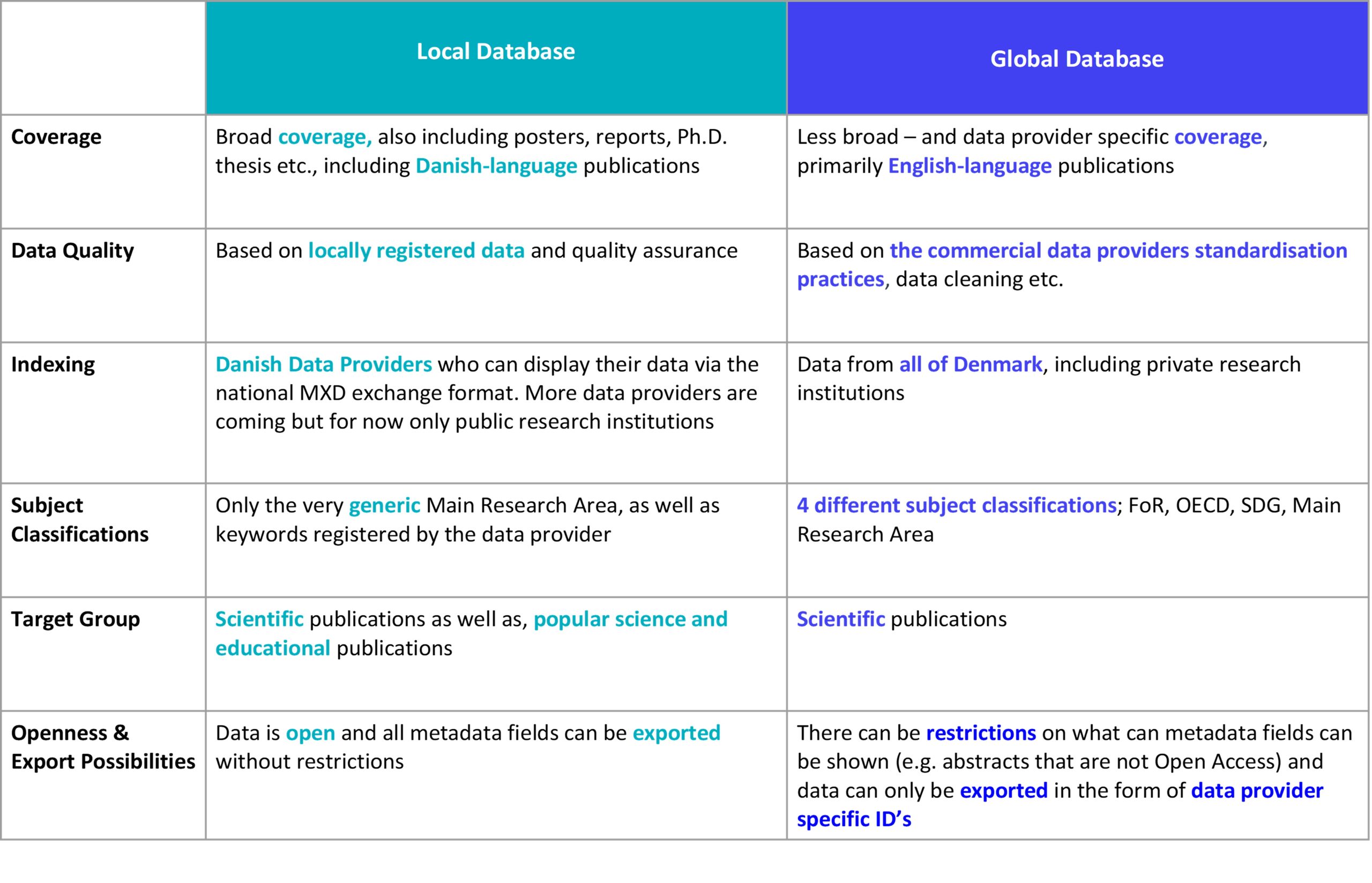
Yes. Using the ‘Matching Records in’ functionality (available in both the filters and in full view), when you are in one of the publication databases, you are able to see which publications are covered by both the Local- and Global Database.
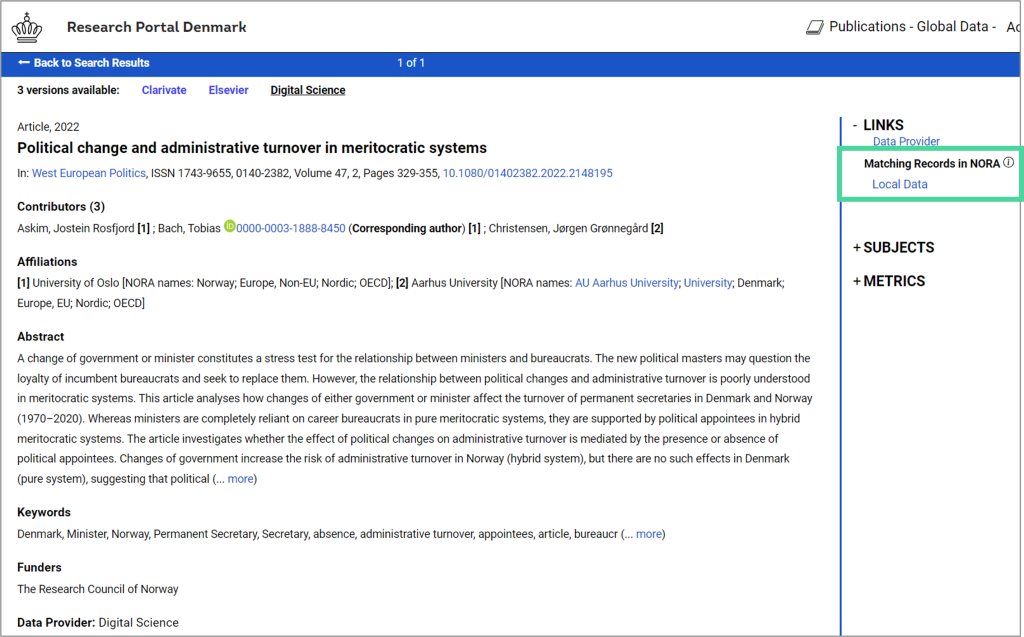
In addition, in both databases you can use the filters under ‘Data Providers’ to see which and how many of the databases data providers the data comes from.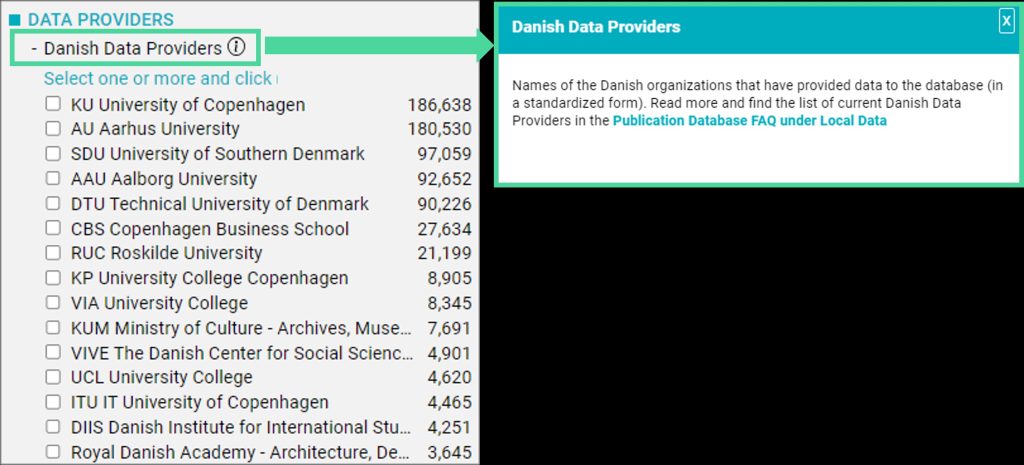
In all databases, we exclusively harvest publication data associated with the country code ‘Denmark’ from the respective data providers. In cases where Danish research institutions collaborate with international counterparts, these collaborations are included in the database, but solely as collaboration partners.
Neither of the two databases – Global or Local Data – independently contains all Danish publications from 2011 onwards, but the two databases complement each other in terms of coverage of Danish publications.
The Global Database, is based on the selection criteria set by the individual global commercial data providers, typically favouring peer-reviewed and English-language publications).
In the Local Database, the degree of coverage depends on the number of Danish Data Providers – meaning research institutions that are data providers and their collaborators are well-covered, while others such as private companies are not covered to the same extent by this database.
All Danish research institutions or organisations with local systems for registering publication output, as well as the option to deliver data via the national exchange format DDF-MXD, are potential Danish Data Providers and partners of Research Portal Denmark.
Find more information about what you as a possible Danish Data Provider should consider and pay attention to in the overview: Kan min institution levere data til Portalen? (in Danish).
For both the Global and Local publication databases, data is collected from the various data providers around the 20th of each month. The data is processed and enhanced. The UI is updated bi-monthly. Users can expect the updates to occur around the beginning of the month, January, March, May, July, September, November. See the Operations Status for the latest updates.
Data is further enhanced by an updated mapping of Danish organization names, based on new name variants. Read more about the different enhancement measures – NORA-Enhancements – that are part of the update process in the technical documentation.
In the Local Database a complete dataset is harvested from each individual Danish Data Provider for every monthly update. This implies that locally registered publications, which have been removed from a Danish Data Provider’s local system, will also be deleted from the Local Database during the subsequent bi-monthly update.
As for the Global Database publication data relies on data from the global commercial data providers. If any data is removed in these commercial databases, the corresponding changes will be mirrored in the Global Database. Entities that have been deleted are removed twice a year during the full update of datasets from the global data providers.
No. All of the Research Portal’s databases are open and accessible to everyone. There may be restrictions on what you can see or download from the individual databases, but the access itself is completely open.
There are 3 search modes in both The Global and The Local Database – Simple, Basic and Expert – which give you the opportunity to search according to your needs and search skills. If you need help in any of the three search interfaces, you can click the ? icon, which is available in all the databases, and find customised search tips.
In all three search interfaces, it is possible to use the Boolean operators – AND, OR, NOT – to combine or exclude several search terms for the same search.

There is no actual search history functionality in the databases at this point. However, in all the publication databases, you can save your search by using ‘Save Query’. When using the functionality a link is generated that you can use to revisit the specific query (incl. filtering) you have created.
In the Local Database the Save Query link in combination with the filter ‘Added on‘ gives you the opportunity to see which new publications have been added to your query since the last update of the database.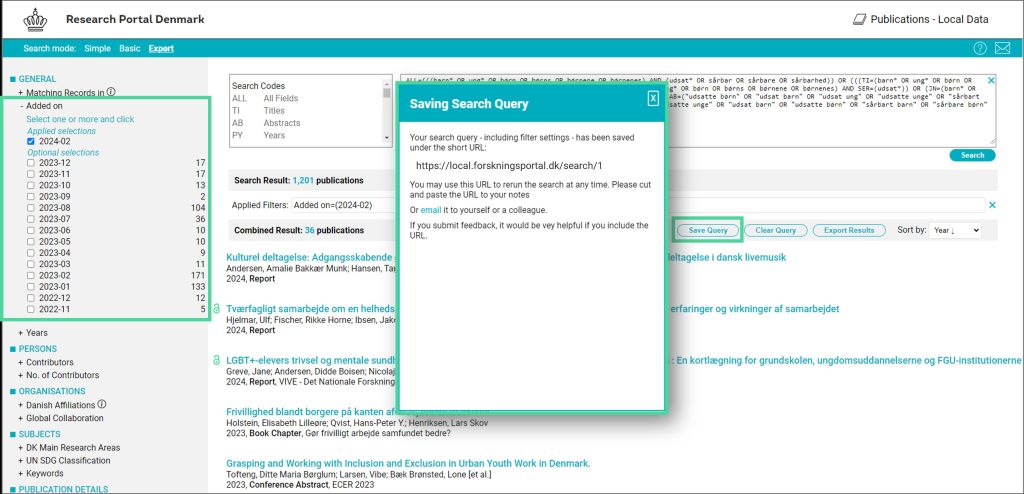
As the databases are bibliographic databases, you only have access to metadata, i.e. descriptive data, about all Danish publications within the data provider’s coverage. In addition, however, in both databases you can access a large number of full texts via the links you find on the full view publication records. Here you will find links to the full-text (Open Access) publications that the Danish Data Providers have registered, links to PubMed and other full-text links that may have been added by the various global commercial data providers.
If you only wish to query publications with full text access, you can use the ‘Open Access’ filter in all the databases to limit your search to only contain Open Access publications.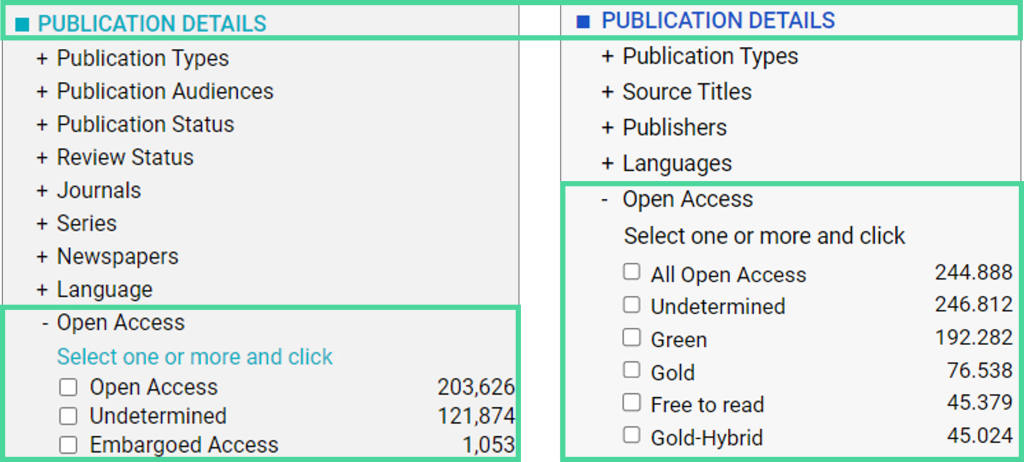
From the three individual global databases, you will soon be able to export publication IDs that can be used for further processing at the relevant commercial data provider’s citation database or analysis tool.
In the Local Database there are several export and download options – you can both export a small data set (max. 20,000 records) directly from your search in several different formats (including Excel and RIS for references) and all or parts of the database in DDF-MXD or JSON format.
Read more about the different possibilities in the section Download Data.
The portal – and the publication databases specifically – has a broad user group, which ranges from researchers and students who use the portal in connection with information search, to research and academic libraries, to start-ups who use data from the Local Database on their own platforms, as well as the Ministry of Higher Education and Science Denmark that uses the portal as parts of their data work.
Get inspired and read more in the overview of some of the portal’s use cases (in Danish).
We always appreciate feedback, questions and suggestions for the development of Research Portal Denmark. The NORA team can be contacted at nora.info@dtu.dk.